Epic in scope, educational in intent, and exquisite in design, Luis Valdez’s Valley Of The Heart examines America’s WWII internment of its Japanese-American citizens and their foreign-born family members in ways both familiar (the Broadway musical Allegiance played L.A. just ten months ago) and original (our narrator is Mexican-American). If only the Zoot Suit playwright proved more adept at creating authentic-sounding dialog. If only Valley Of The Heart didn’t so often feel like Wikipedia on stage.
The year is 2001, the place is L.A., but it’s back to the Santa Clara Valley circa 1941 that our octogenarian narrator Benjamin (pronounced Ben-ha-meen) Montaño (Lakin Valdez) escorts us now, six decades after the bombing of Pearl Harbor transformed his life and the lives of those around him.
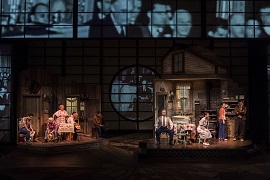 These include Benjamin’s sharecropping parents Cayetano and Paula (Daniel Valdez and Rose Portillo), his teen siblings Tito and Maruca (Moises Castro and Christy Sandoval), and the Japanese family whose land they till—first-generation immigrants Ichiro and Hana Yamaguchi (Randall Nakano and Joy Osmanski) and their grown children Teruko aka Thelma and Yoshi aka Joe (Melanie Arii Mah and Justin Chien), the former about to enter intro an arranged marriage to her brother’s college roommate Calvin Sakamoto (Scott Keiji Takeda) but secretly attracted to Benjamin and he to her.
These include Benjamin’s sharecropping parents Cayetano and Paula (Daniel Valdez and Rose Portillo), his teen siblings Tito and Maruca (Moises Castro and Christy Sandoval), and the Japanese family whose land they till—first-generation immigrants Ichiro and Hana Yamaguchi (Randall Nakano and Joy Osmanski) and their grown children Teruko aka Thelma and Yoshi aka Joe (Melanie Arii Mah and Justin Chien), the former about to enter intro an arranged marriage to her brother’s college roommate Calvin Sakamoto (Scott Keiji Takeda) but secretly attracted to Benjamin and he to her.
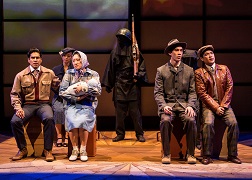 Then comes the Japanese attack on Pearl Harbor and Executive Order 9066 leading to the forced internment of as many as 120,000 people of Japanese ancestry, 62% of whom were American citizens.
Then comes the Japanese attack on Pearl Harbor and Executive Order 9066 leading to the forced internment of as many as 120,000 people of Japanese ancestry, 62% of whom were American citizens.
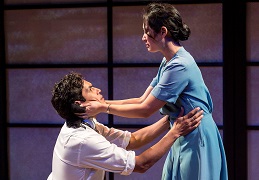 Fortunately for Ichiro and Hana, the Yamaguchis can avoid having to sell their home and land at a tiny fraction of their worth to rapacious white Americans by leasing their property to the Montaños on a till-the-war-ends basis.
Fortunately for Ichiro and Hana, the Yamaguchis can avoid having to sell their home and land at a tiny fraction of their worth to rapacious white Americans by leasing their property to the Montaños on a till-the-war-ends basis.
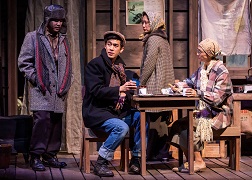 Unfortunately for those in the audience who’ve become invested in Benjamin and Thelma’s “forbidden love” (her words, not mine), their relationship soon takes second place to the Yamaguchis’ and a jilted Calvin’s lives in Heart Mountain, Wyoming where Thelma, four months pregnant when she married Ben, must raise their infant son Benjiro on her own.
Unfortunately for those in the audience who’ve become invested in Benjamin and Thelma’s “forbidden love” (her words, not mine), their relationship soon takes second place to the Yamaguchis’ and a jilted Calvin’s lives in Heart Mountain, Wyoming where Thelma, four months pregnant when she married Ben, must raise their infant son Benjiro on her own.
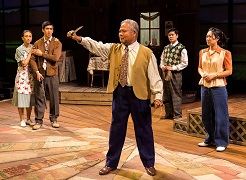 Anyone unschooled in the illegal, racism-propelled internment camps established in the middle of nowhere after Pearl Harbor will find Valley Of The Heart an eye-opener.
Anyone unschooled in the illegal, racism-propelled internment camps established in the middle of nowhere after Pearl Harbor will find Valley Of The Heart an eye-opener.
Still, coming so soon after Allegiance, Valdez’s new play seems more than a bit of a retread. Both have one son going off to fight with the all-Nisei “Go For Broke” 100th Battalion and another ending up one of a small number jailed for refusing to sign a loyalty oath, though unlike Allegiance, Valley Of The Heart ignores the many ways internees managed through gumption and resourcefulness to make camp life bearable.
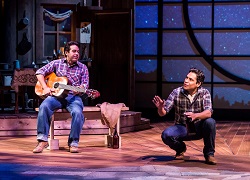 Valdez’s legendary Zoot Suit snapped, crackled, and popped. By contrast, much of the writing in Valley Of The Heart fizzles, whether it’s Douglas Sirk-style dialog (“I will always love you Ben. Please don’t hate me. Goodnight … and goodbye.”) or melodramatic overkill (“My daughter belongs to another man now! She’s not for him!”) or corny slang (“Once we’re married, our sugar shack’s gonna be in San Francisco.”) or lines it’s hard to imagine anyone ever saying (“If the Japanese army lands in San Francisco, I must go out and greet them with the rising sun.”) or Spanglish that doesn’t entirely ring true (“Los Estados Unidos is at war with Japón).
Valdez’s legendary Zoot Suit snapped, crackled, and popped. By contrast, much of the writing in Valley Of The Heart fizzles, whether it’s Douglas Sirk-style dialog (“I will always love you Ben. Please don’t hate me. Goodnight … and goodbye.”) or melodramatic overkill (“My daughter belongs to another man now! She’s not for him!”) or corny slang (“Once we’re married, our sugar shack’s gonna be in San Francisco.”) or lines it’s hard to imagine anyone ever saying (“If the Japanese army lands in San Francisco, I must go out and greet them with the rising sun.”) or Spanglish that doesn’t entirely ring true (“Los Estados Unidos is at war with Japón).
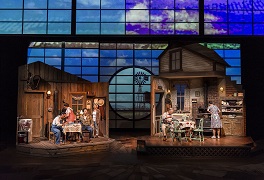 It’s a shame because Valdez has created interesting characters and relationships, and though Valley Of The Heart could use a trim (the Japanese hot tub scene for example could easily be cut), it holds your interest, is stunningly designed* (David Murakami’s widescreen projections merit particular oohs and aahs) and gracefully if anonymously choreographed, uses faceless, black-clad Japanese style kurogo (Mariela Arteaga and Michael Naydoe Pinedo) to consistently imaginative effect (the human jeep they make is a particular treat), and just wait till you see the production’s life-sized puppet pooch.Ben
It’s a shame because Valdez has created interesting characters and relationships, and though Valley Of The Heart could use a trim (the Japanese hot tub scene for example could easily be cut), it holds your interest, is stunningly designed* (David Murakami’s widescreen projections merit particular oohs and aahs) and gracefully if anonymously choreographed, uses faceless, black-clad Japanese style kurogo (Mariela Arteaga and Michael Naydoe Pinedo) to consistently imaginative effect (the human jeep they make is a particular treat), and just wait till you see the production’s life-sized puppet pooch.Ben
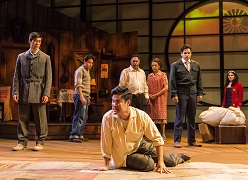 As director, playwright Valdez scores points for ingenuity but less for eliciting performances that overcome his script’s multiple challenges, though dynamic leading man Valdez does standout work as Benjamin and Takeda gets to do some powerful emoting as a man not dealing well with rejection.
As director, playwright Valdez scores points for ingenuity but less for eliciting performances that overcome his script’s multiple challenges, though dynamic leading man Valdez does standout work as Benjamin and Takeda gets to do some powerful emoting as a man not dealing well with rejection.
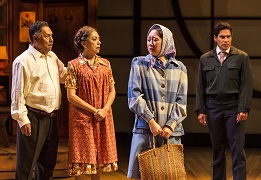 Kinan Valdez is associate director. David S. Franklin is production stage manager and Susie Walsh is stage manager. Edgar Landa is fight director. Daniel Valdez is music consultant.
Kinan Valdez is associate director. David S. Franklin is production stage manager and Susie Walsh is stage manager. Edgar Landa is fight director. Daniel Valdez is music consultant.
Casting is by Rosalinda Morales and Pauline O’con, CSA. Natalie Camunas, Ricky Pak, Melodie Shih, and Michael Uribes are understudies.
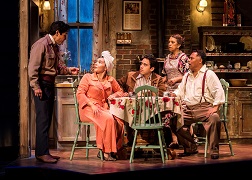 Kelley Kirkpatrick is associate artistic director and Phillip Esparza is executive producer for El Teatro Campesino.
Kelley Kirkpatrick is associate artistic director and Phillip Esparza is executive producer for El Teatro Campesino.
Though far from a bad play, Valley Of The Heart isn’t nearly the great one it aims to be. It’s admirable that the Yamaguchis’ and Montaños’ stories are being told, but they deserve a less hackneyed, more nuanced telling than this Mark Taper Forum World Premiere.
*Philip G. Allen (sound design), John Iacovelli (scenic design), PJ Hirabayashi and Roy Hirabayashi (original compositions and arrangements), Noé Yaocoatl Montoya (additional arrangements), Pablo Santiago (lighting design), Lupe Valdez (costume design)
Mark Taper Forum, 35 N. Grand Avenue, Los Angeles.
www.centertheatregroup.org
–Steven Stanley
November 7, 2018
Photos: Craig Schwartz
Tags: Center Theatre Group, Los Angeles Theater Review, Luis Valdez, Mark Taper Forum



 Since 2007, Steven Stanley's StageSceneLA.com has spotlighted the best in Southern California theater via reviews, interviews, and its annual StageSceneLA Scenies.
Since 2007, Steven Stanley's StageSceneLA.com has spotlighted the best in Southern California theater via reviews, interviews, and its annual StageSceneLA Scenies.







 COPYRIGHT 2024 STEVEN STANLEY :: DESIGN BY
COPYRIGHT 2024 STEVEN STANLEY :: DESIGN BY